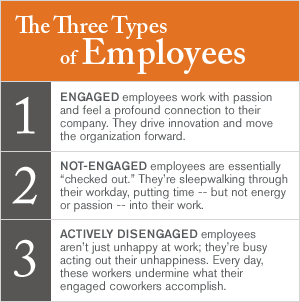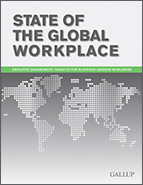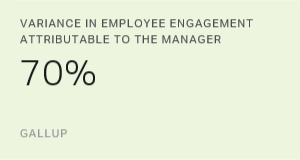Fostering employee engagement represents a vast untapped approach to increasing labor productivity in Russia.
Modern Russia's workforce has a number of advantages, including high literacy and labor participation rates and an impressive proportion of people with post-secondary education. Yet Gallup's 2012 data show that more than 80% of the country's employees are less than fully engaged at work; they lack an emotional connection to their workplaces and are not enthusiastic about their jobs.
Further, almost one-fifth of all Russian workers are actively disengaged, meaning they harbor negative feelings about their jobs that prevent them from creating value for their businesses. Instead, they often do more harm than good and hinder Russia's overall economic performance.
Fostering employee engagement thus represents a vast untapped approach to increasing labor productivity in Russia. The country's GDP per hour worked is about 40% that of the U.S., where employees are more likely to be engaged with their jobs. If Russian employers could move the country's actively disengaged workers -- currently 19% of all employees -- into the "not engaged" category, they could increase their output per worker by almost 4%. This increase, applied to the $42,635 (U.S.) average output per worker in Russia, amounts to $1,646 (U.S.) per person, or more than $116 billion (U.S.) overall.
Four ways to win employees' hearts and minds
To increase productivity, Russia is rightly investing in innovation and technology projects, such as the Skolkovo Innovation Center near Moscow. But attempts to create a more innovative culture will do little to increase the average productivity of Russian employees unless they are accompanied by organizational changes designed to win the hearts and minds of those employees. The following are among the most important considerations in pursuing that goal:
- Improve the quality of management and leadership. Gallup research has demonstrated that a team's immediate manager is responsible for the lion's share of its members' engagement. A great manager can create the motivation and energy a team needs to perform well, while a bad one can destroy that motivation and spread discontent among employees. This has significant implications for business outcomes; for example, highly engaged teams have 48% fewer safety incidents and 41% fewer quality defects than those with low engagement levels. Business leaders must remove managers who consistently fail to engage their employees, hire and promote for leadership talent, and provide more opportunities to develop and reward people management skills.
- Promote a culture of trust and integrity. Almost eight in 10 Russians (77%) surveyed in 2012 said corruption is widespread in the country's businesses. Business leaders can create empowered and productive workforces only if they work to reverse the country's long history of corruption. Leading companies committed to change must implement sound corporate governance and a zero-tolerance policy for unethical behavior. These businesses should introduce and promote methods for reporting such behavior anonymously to help promote a culture of trust and integrity.
- Give more opportunities to older workers. Fifty-six percent of Russians over 50 who work for an employer strongly agree that their opinions count in the workplace. This percentage is significantly lower than the 70% of workers aged 25 to 34 who say the same. Many Russian businesses fail to maximize the potential of older employees, instead providing more opportunities to younger, less experienced workers. This mindset originated in the 1990s, when the transition from a planned to a market-based economy depended on workers' flexibility and agility. In 21st century Russia, however, there is a greater demand for seasoned people managers and specialists with extensive experience. Employees from older generations are best positioned to satisfy this demand.

- Continuously strive to eliminate disengagement and measure progress. Workplaces in Russia that implement engagement strategies achieve a ratio of five engaged employees for every actively disengaged employee, compared with the overall Russian working population's ratio of 1-to-1. These examples show that it is possible to foster an engaging workplace culture in Russia and use it as a strong competitive advantage. Companies can achieve this through strategic initiatives aimed at overcoming barriers to engagement -- such as a command-and-control culture, fear of speaking out, or a silo mentality -- and fostering engagement builders -- including empowerment and accountability, a culture of open and honest dialogue, and frequent collaboration.
Focusing on the key strategies above -- and continuously tracking progress on those strategies -- will make a significant contribution to Russian employees' productivity. This, in turn, will fuel business growth and strengthen Russia's economy.

